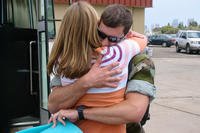How can service members and their families best prepare for their overseas tours? Honestly, there is not a lot of good information out there about PCSing to Europe. The nuggets you do find on official websites can be confusing or raise even more questions.
That's why I started blogging about the overseas experience. As a family member, a soldier and then as a spouse, I have been through numerous tours in both Germany and Belgium. As a result, I put together more than two dozen tips that will be more useful for your PCS to Europe so you can be more ready that you ever dreamed possible.
- Decide whether to live on or off post. Choosing a home will be the most important decision you make. Each kaserne and base will be different. Your first choice will be whether to live on or off post. If you choose to live off post or the wait is too long for on-post housing, you'll need to visit the Overseas Housing Allowance (OHA) calculator to find out what your cap on rent is. Army installations still require those E-5 and junior to live on post. If you are on an Air Force installation, that rule does not apply.
- Ship one or two vehicles. The military will pay to ship one vehicle. There is endless debate on whether to bring a super large vehicle like a full-sized truck. I say, if it is paid for, bring it. You will learn how to deal with narrow roads and parking spaces and parking garages that have lower ceilings (know the height of your vehicle). Many folks buy their second vehicle on post with European specs, meaning it can't be taken back stateside. Others ship a second vehicle on their own dime -- anywhere from $1,000 to $3,000 to have it shipped. If you have a lien on your vehicle, you may not be able to ship it. Check with your lender to find out more details and find out on my blog how to combat that particular obstacle.
- Decide which belongings to store and which to ship. This is a tough one. On post, you'll have at least one room-size storage room in the basement or a shed. Off-post housing consists of smaller and awkward room sizing. People sometimes have problems getting a queen-sized box spring up the stairs -- so buy split box springs. Stairways can be narrow and steep here. There may not be room for sectional sofas or even a complete dining room set. We left all of our 110-volt stand mixers, our expensive vacuum and 110-volt holiday decorations in storage, although on-post housing in most locations will have both 110- and 220-volt outlets.
- If you have a GSM cell phone with a SIM slot, bring it. There is no use for CDMA technology (like Verizon phones). Don't bother bringing those. As long as your cell phone is unlocked, you will be able to use it in Germany. Do talk to others and find out which provider has the best coverage in your area. You may even wait to see which provider has the best coverage in your new home. Until then, there are 10-20 Euro prepaid cell phones you can give to your kids or guests to use or that do double duty as a backup cell phone.
- Research TV watching options. If you live on post, you automatically get AFN TV straight out of the wall with no set up required. Off post requires the purchase of an antenna and receiver costing hundreds of dollars. Look for a secondhand set and make sure it is a digital model. Or you can do what we did and purchase an Apple TV or Roku device (or other smart TV or receiver) and watch your favorite shows on your TV. You will need a VPN service to unlock certain subscriptions and websites such as Netflix and Hulu Plus.
- Find out how you will pay your bills. I recommend keeping your current bank account and getting a local on-post account to handle ATM cash transactions and the paying of your German bills.
- Definitely get ADAC roadside assistance. The cost is less than 100 Euros a year and the benefits are priceless. Without it, a simple tow from a few miles away can cost over 100 Euros ... one way. Some stateside providers do provide roadside assistance overseas, but many times it is not generous enough and you may find yourself looking for your own towing company and then filing for reimbursement later.
- Stock up on routine car parts. I purchased things like oil filters, snow tires, windshield wipers and other typical car parts to bring with us overseas. There is typically a car care center on-post just like stateside. You won't totally be on your own. If you go off post, know that American car parts are super expensive AND there can be a long wait involved in getting those part. Each military community has an auto crafts center and many will have folks who can do the work for you or have someone on-hand who can walk you through an oil change or other simple repair.
- Stock up on favorite products. I'm a big fan of the big box stores and knew I would miss that experience, so I stocked up on our favorite paper products. Most of my stockage lasted only six months, but it was worth the trouble. The commissary will have case lot sales a few times a year, but the product choices are limited. German products are different for the most part. It is nice though that you can find good substitutions for most items, especially food and laundry items off-post.
- Find a great Facebook page for your new duty station. There is always a wealth of information to be found there, and you'll find a handful of folks always ready to answer that next question.
- Study for the driving test. Technically, you are not even allowed to drive a rental car on-post without your USAREUR driver's license. Before you take the test, be sure to memorize road signs and speed limits and then go ahead take the class and test within the first week of arrival. Practice tests are available online, and you'll find directions on the blog.
- Make your lodging reservation as soon as you have your assignment instructions. This is critical as there is limited space in on-post lodging, much of it fairly new with kitchen facilities and American-style beds and customer service. Some have pet rooms that fill up quickly. Even if you don't know your exact dates, be conservative with your dates, then narrow it down later. You do not need orders to make reservations. Many posts will require you to have a statement of non-availability from on-post lodging before making your own arrangements or take the risk of not getting reimbursed! If staying off-post, try to choose a world-wide hotel chain with generous reward points. I can tell you we stayed free all over Europe with our points that were racked up from moving and my husband's TDY trips.
- Know your benefits. Every single move we've had, there has been a mistake in what money we received back from the government to pay for the move, lodging and food. You will file for your Temporary Lodging Assistance every 10 days during your house hunt or your wait to move in on-post. Make sure you can sign in online and check your servicemember's LES and always follow up with what you think you should be getting paid.
- If you have pets, start the process now. Make sure their rabies vaccine is within one year but not less than 30 days before flying. Try to use a military vet on-post who can do the needed USDA paperwork and stamp. Once you have orders in hand, immediately make that flight reservation and make sure your pet is included in your record. Each airline is different and you need to read through their international requirements. The cheapest way is always via military air. Always.
- Think through your unaccompanied baggage. Factor at least 30-60 days in a hotel or temporary lodging and before having access to your household goods. Consider the weather. Think about what items you need short term and know there are resources like loaner furniture and the ACS lending closet to help you out. If your children will start school soon, I'd suggest purchasing basic school supplies and backpacks before you move. That stuff is limited and expensive at the Exchange on-post and German school supplies are very different.
- Go the newcomer's page for your new duty station. You will be surprised at how thorough some communities are in arming you with the basic information you need. You will most likely find out how the housing process works on the newcomer site as well and find out more about any newcomer and in-processing classes. I urge spouses to go too. Make sure your kids have current physicals and register them at your CDC to get that childcare taken care of immediately, allowing you to in-process as well.
- Renew your stateside driver's license and keep it current. Each state has different rules for military and dependents driver's licenses. Know what the rules are. Some will allow you to have an expired license as long as you are out of state and have a valid military ID. Others will let you renew once or twice online and then through the mail after that. A few states still do everything the old-fashioned way through the mail. Put the expiration dates in your calendar and renew as needed. Some will charge you a late fee if you renew after expiration. Do the same for your passports! Many countries will not let you enter without having at least six months left before your passport expires and realize that your government-issued SOFA (Status of Forces Agreement) passport will NOT let you travel over Germany's borders (except back stateside). Investigate purchasing a tourist passport before you leave.
- Make sure you have renter's insurance. You should have this anyway even while living in on-post quarters. The government typically will not reimburse you should your items get lost, stolen or damaged. It is very cheap insurance for the peace of mind.
- Bring your 110-volt lamps. You can change the lightbulb to a 220-volt one along with a plug adapter, and you're done. Do watch the wattage of that lightbulb, as you don't want your lampshade burning up. Most lampshades list the max wattage on the lampshade somewhere.
- Know your internet options. There are so many internet options for your home. Germany has many third-party providers. You not have to go with what is offered on-post. You can get the current provider on-post to sign off on paperwork to get an off-post provider. Do know what the different is between DSL and cable, as not all housing on- and off-post will have either or both.
- Find the deals for overseas travel. There are a host of milspouse travel Facebook pages where advice is shared and questions are answered. You'll never pay full price.
- There will be certain things you wish you had brought over and didn't. Life Lessons of a Military Wife readers wish they had brought drying racks, memory foam mattress pads, extra bedsheets, two cars, area rugs, Slingbox and smaller bakeware that can fit in European ovens.
- Bring your best parenting. You may need to do a little research on traveling for eight hours on a plane with a baby or toddler. You might have a teen who refuses to move overseas. You aren't the first. Since kids are so important to military families, you will find lots of advice online on the blog. Do what is best for you.
- Attend the in-processing briefs at your new duty station. You might be tempted to let your service member do the inprocessing while you catch up on your sleep. Don't. At those briefs, you meet the kind of people who can actually help you settle in better. Meet the school lady and the housing guy, the Tricare person and the trainer from Army Community Service (ACS). Real people are your best resource when moving overseas -- and in-processing is the time to meet them.
- Eating out in Europe can be more expensive than stateside. Schnitzels and beers for the family can run you $115. When you have to eat on the economy, know that there are cheaper options like your local Donerkebab Stand, the local Volksmarch or even your favorite IKEA.
- APO mail service overseas is a bit different than stateside mail. Know how it works, how to figure out what your German address is (even on-post) and know how to send mail to your German address.
- Know what a VAT form is and how it can save you money. This can be especially useful if you spend a long time in an off-post hotel. Amazon.de is very popular in Germany, and you can save the VAT tax when you have things sent to your German address.
This list of 27 things covers the highlights to allow you to hit the ground running when you PCS to Germany, Belgium or other European locations.
-- Raquel Thiebes has been blogging about living overseas since 2007. She recently PCSed with her family from Germany to Belgium and back again.













